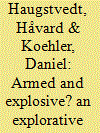|
|
|
Sort Order |
|
|
|
Items / Page
|
|
|
|
|
|
|
| Srl | Item |
| 1 |
ID:
190996


|
|
|
|
|
| Summary/Abstract |
Extremist infiltration of armed forces, and the spread of violent radicalization among service members and former soldiers, are a growing international concern. With an increased number of active duty and former soldiers involved in extremist and terrorist milieus, the public fears that national security might be compromised by potential terrorists using their training, equipment, and networks against the countries they swore to protect. This is a serious impediment to the trust in authorities for many nations. However, little empirical research exists on either the scope of the problem, or the specific risk factors that might be involved in turning military personnel toward extremism. In this paper, we utilize the “Profiles of Individual Radicalization in the United States” (PIRUS) dataset to shed light on the vulnerability and risk factors into the extremist radicalization of military personnel. Our findings indicate that far-right radicalized individuals with military backgrounds are more likely to suffer from trauma, a diminution of social standing, having difficulties in romantic relationships, and exclusion from participation in social groups or organizations, compared to far-right radicalized individuals without military backgrounds. Mental illness, grievance, and anger toward society are also more present in the far-right military group compared to the non-military group.
|
|
|
|
|
|
|
|
|
|
|
|
|
|
|
|
| 2 |
ID:
191007


|
|
|
|
|
| Summary/Abstract |
Social workers are a part of the prevention efforts against radicalisation and violent extremism in the Nordic countries. While multi-agency cooperation is not new in Norway, municipal cooperation with the police security service is. This cooperation, particularly its unintended consequences with a specific focus on the securitisation of “soft professionals” in the public sector, has been scarcely researched. We address this gap with findings from a qualitative study based on seventeen individual in-depth interviews and two focus-group interviews with experienced social workers in Norway. Abbott’s theory of jurisdiction serves as our theoretical framework. Our findings suggest that social workers in some cases appear subordinate to law enforcement personnel. Further, the lack of clarity of roles and responsibilities raises ethical and professional dilemmas, especially regarding work transparency and client confidentiality, indicating an outside influence of security onto prevention work. An unintended consequence of this is the risk of lower levels of trust between prevention workers and their target group and a reduced ability to support at-risk individuals. Clarification of the roles and responsibilities of all partners involved in multi-agency PVE should be given attention from both policymakers and practitioners.
|
|
|
|
|
|
|
|
|
|
|
|
|
|
|
|
| 3 |
ID:
180496


|
|
|
|
|
| Summary/Abstract |
UAVs have been used by non-state actors in the past decade. However, no known attack by right-wing extremists has been carried out using them. Håvard Haugstvedt reviews recent developments in attacks – through online activity in open forums and by examining groups that have already used UAVs in their operations – by such actors, to explore the possibility of right-wing extremists adopting UAVs. The article argues that right-wing extremist groups lack a strong entity, such as a state, backing their development and operations. However, terrorist groups learn from one another, and as extreme right-wing ideologies have gained currency among some members of the military and law enforcement agencies, the capability to develop and use UAVs may be more possible than that which has been revealed thus far. Nonetheless, this article casts doubt on right-wing extremists’ capability and desire to incorporate UAVs into a violent repertoire that has historically been composed of fists, fires and firearms.
|
|
|
|
|
|
|
|
|
|
|
|
|
|
|
|
|
|
|
|
|